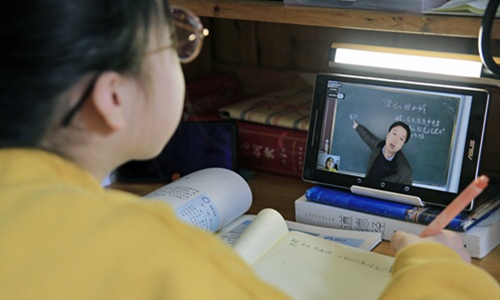Public dispute over suggestion of giving extra points in gaokao to children of medics fighting COVID19

A student takes an online course at home in Yuncheng, North China's Shanxi Province during the coronavirus outbreak. Photo: IC
Li Guoqing, co-founder of China e-commerce platform Dangdang.com, said on a video program that he opposes the idea of giving extra points in China's college entrance exam gaokao to children of medical staffers fighting COVID-19, sparking a discussion on China's social platforms on Friday.
A netizen suggested in previously to give extra points in gaokao to children of frontline medical staffers lauded as heroes in the coronavirus combat. Li said fairness should be guaranteed as educational resources in China are scarce.
"The medical staffers are like soldiers," Li said in the video clip, noting that he is really moved by the contributions of the medics.
But he contends that gaokao should let the children stay on the same starting line. "So we should not give extra points based on special social contributions," Li noted.
Li's comment was echoed by some netizens. "I also disagree with this. The points should be gained by your own efforts, instead of your parents'," a Weibo user said.
A netizen suggested to give some economic compensation to medics instead of preferential policies to their children. Some also said that other personnel, like police in epidemic control and construction workers joining the construction of temporary hospitals, also should be taken into account.
"Gaokao matters a lot and should be fair. Even one point in the gaokao score could fail a lot of students," another one wrote.
Some netizens showed their understanding. "I can understand and agree to give extra points to children of frontline medics as they have saved so many lives by risking their own lives," another one commented.
Wu Zhihui, head of the Research Institute of Rural Education at Northeast Normal University, suggested that the educational authorities collect advice from colleges and universities and expand enrollment quota appropriately.
"Based on this, some colleges and universities can lower certain points for these students based on specific conditions," Wu said, noting that such a preferential policy is not unconditional, because students still have to meet a certain level.
